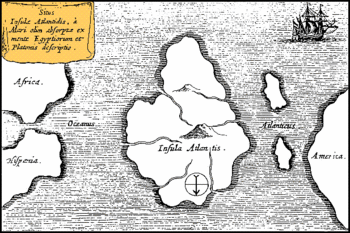
For unknown reasons, waves from the Atlantis story have been crashing on my desk the last few days. First, a colleague forwarded me an excerpt from Mark Adams recent book ‘Meet me in Atlantis‘ describing an interview with Greek geophysicist and Atlantean expert Stavros Papamarinopoulos which shed light on a few rather matter of fact considerations about the existence of the lost city from interpretations of Plato’s account.
Second was an accidental stumble upon a Nat Geo Channel piece called ‘The Truth Behind: Atlantis‘ which presented the topic for public and popular consumption through a very cursory investigation of both the Bimini Road in the Bahamas, and a variety of Minoan sites in Greece, namely Crete and the island of Santorini.
Lastly was an article on CNN describing the state of Venice, with sea level on the rise and the city itself sinking, creating an imminent threat to losing this coastal historical site – sound familiar?
 |
| English: Athanasius Kircher’s Map of Atlantis (c.1669). Note that north is at bottom. Latina: Situs Insulae Atlantidis, a Mari olim absorpte ex mente Egyptiorum et Platonis descriptio. (Photo credit: Wikipedia) |
What continues to resonate with me in my own curiosities about Atlantis is the timetable that we are versus what we should be talking about. Events at Santorini and Crete reference the time of the Minoans, say 3500 years before present. The volcanic eruption at Santorini during that time period is said to have caused a major tsunami (for which there is emerging scientific evidence) that wiped out a considerable part of Minoan civilization and was the inspiration for Plato’s “story” about Atlantis in his book/dialogue Timaeus.
The source of the hotly debated timetable comes from Plato’s reference to events occurring 9000 years before his telling of the story, which puts us about 12,000 years before present. That has spun the heads around of many scholars for centuries, as 12,000 ypb is far before any known civilization that we have actual archaeological evidence to support the existence of. So, if it were wiped out, it was really wiped out – without a trace. This seems highly unlikely to most, as consider that we are able to find scientific evidence of things like dinosaurs from millions of years ago to help recreate a story of our history here on Earth. The fact that we have a considerable information gap is what is so fascinating, and beckons intrigue from a variety of perspectives.
One in-explainable fact is that ‘advanced’ civilization seemingly sprang up from virtually nothing, and all since Atlantis allegedly disappeared. Where did the technology and intellect come from? Further to that, there are specific devices that leave us at a loss for their direct lineage. As we well know today, innovation is a lengthy and evolving process, and one would expect a lineage of technology prior to defining a specific piece. The perfect example is the Antikythera mechanism. The mechanism is one of those anomalies that begs far more questions than it offers answers.
The questions of the Bimini road is supported with only anecdotal evidence, despite the ‘road’ being very accessible in shallow water. Where the road fails us is the depth. If we were to rewind history to 12,000 years before present and re-create a world map, our coastlines would look VERY different. Sea level was around 300-400 feet lower than it is today as we were at the last glacial maximum of the Pleistocene. That puts more than 50% of the world’s continental shelf in the dry. A seafaring civilization like Atlantis would have lived along the coast – now submerged, far from sight, and difficult to access. Perhaps we haven’t yet found concrete evidence because we haven’t spent enough time looking in the right place…
Interestingly, today we are faced with very similar circumstances to 12,000 years ago. Sea level is on the rise, in part due to additional glacial retreat, and that means coastal civilization is in trouble. The current state of affairs in Venice should be closely watched by the world, as it will serve as a model for how we preserve other coastal cities. Regardless of Plato’s Atlantis being fact or fiction, it is cause to pause and think, and if nothing else should serve as reminder that we are not invincible.
The waves that sank Atlantis have had a rippling effect which ironically may sink us yet again. In all of our greatness, one would think [sarcasm] we’re paying enough attention to preserving and protecting the world around us in order to better protect ourselves.
Donate today using Google’s ‘One Today’ program to help us redefine the human element and develop new content. Donate $1 today!
Because you gotta look good in the field, shop our store for OO apparel!






